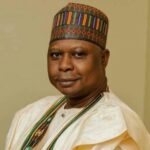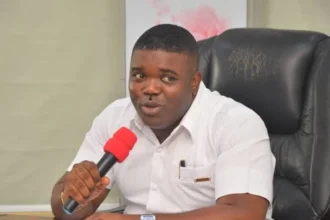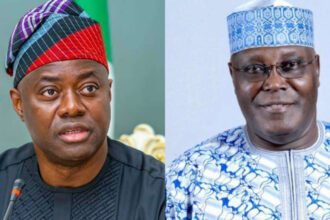
Former President Olusegun Obasanjo has disclosed that he turned down a proposal to anoint former Kaduna State Governor, Nasir El-Rufai, as his successor in 2007, describing him at the time as “not yet mature enough” to handle the responsibilities of Nigeria’s highest office.
Obasanjo made this revelation on Friday, October 24, during the second edition of the Ajibosin Platform Annual Symposium held in Abeokuta, Ogun State, with the theme: “The Importance of Leadership in Governance.”
According to the former president, the idea of El-Rufai succeeding him was floated by Chief Osita Chidoka, who served under his administration and had strongly advocated for El-Rufai, citing his brilliance, reformist zeal, and administrative competence.
El-Rufai served in Obasanjo’s government first as Director-General of the Bureau of Public Enterprises (BPE), where he played a key role in the privatisation programme, and later as Minister of the Federal Capital Territory (FCT) between 2003 and 2007.
In a friendly exchange that drew laughter from the audience, Obasanjo recounted how Chidoka, then a close aide, had persistently pressed him to consider El-Rufai as the most suitable person to continue his legacy after his exit from office.
“He was pushing when I was leaving government that his friend, El-Rufai, should be brought in as my successor,” Obasanjo said, turning toward Chidoka, who was seated among the panelists. “No be so?” he asked in pidgin English, prompting Chidoka to nod in agreement.
The former president continued, “I did not yield to the pressure. Later, he said, ‘I suggested this person, why didn’t you agree?’ I told him El-Rufai needed to mature. Many years later, when he observed El-Rufai’s performance, he came back to me and said, ‘You were absolutely correct. El-Rufai needed to mature.’”
Obasanjo’s remarks, though delivered humorously, underscored his approach to leadership succession — one that values emotional intelligence, patience, and personal growth over raw intellect or ambition.
Despite rejecting the proposal, the former president spoke warmly about both El-Rufai and Chidoka, praising them as individuals of “special attributes” who made substantial contributions to his administration’s achievements in governance and reform.
“I hold both of them in high regard,” Obasanjo said. “They are brilliant minds who served with distinction. But in leadership, brilliance must be tempered with maturity, patience, and empathy — qualities that define true public service.”
Reflecting on the broader issue of leadership in Nigeria, Obasanjo lamented the lack of structured mentorship and training in politics compared to other professions. He drew a vivid comparison to even the criminal underworld, stressing that political leadership should not be left to chance or trial and error.
“It’s only in politics that I found there is no training for leadership,” he said. “Even among armed robbers, I was told there is apprenticeship. But it’s only in politics that there is no form of apprenticeship or preparation for leadership. That’s not good enough.”
The former president argued that effective governance demands not just intellect or ambition, but a deliberate process of nurturing, experience, and exposure that shapes leaders to serve selflessly and responsibly.
In his keynote address, Chief Osita Chidoka, a former Minister of Aviation, offered a candid analysis of Nigeria’s leadership crisis, attributing it largely to what he described as “the politics of alibi” — a tendency among leaders to make excuses rather than take responsibility for failures in governance.
According to Chidoka, Nigeria’s development challenges are not due to a lack of ideas, but a lack of institutional continuity and accountability mechanisms that ensure sustainability beyond individual administrations.
“Leadership finds its true measure not in charisma but in the systems it leaves behind,” Chidoka said. “Nigeria’s problem has never been a shortage of ideas; it is the absence of systems strong enough to outlive their authors.”
He urged leaders at all levels to shift focus from political rhetoric to measurable results, stressing that governance must be rooted in institutional strength and accountability rather than personality cults.
Chidoka further argued that Nigeria’s path to stability and progress lies in building robust systems that enforce transparency, efficiency, and responsibility. “When leadership is built around individuals, governance becomes vulnerable to collapse when those individuals exit,” he warned. “True leadership institutionalises success and ensures continuity.”
The former minister said that both at the federal and state levels, Nigeria’s leaders must learn to design governance structures that outlast political tenures and serve the people regardless of who occupies office.
“Systems are what transform vision into reality,” he noted. “When we build systems, we no longer depend on luck or strong personalities; we depend on rules, processes, and accountability.”
Obasanjo’s remarks were consistent with his long-held belief that leadership is fundamentally about character and service, not personal ambition or political convenience. Throughout his speech, he emphasized that governance must reflect integrity, competence, and a genuine commitment to public welfare.
He reiterated that maturity in leadership is not just a function of age, but of discipline, humility, and the ability to balance passion with prudence. “A good leader must have character, exposure, and training. Without these, power becomes a burden, not a blessing,” he said.
The former president warned against the growing culture of entitlement in politics, where individuals assume leadership positions without the necessary grounding or understanding of service.
The symposium, hosted by Aare Olanrewaju Bakinson, was designed to promote discourse on ethical and visionary leadership, governance reforms, and youth participation in politics. Bakinson, in his opening remarks, said the event’s purpose was to deepen the understanding of leadership as a responsibility rooted in service, not self-interest.
“Leadership is not just about power; it’s about responsibility, vision, and service,” he said. “We must continue to remind our leaders that power without purpose is dangerous, and governance without ethics leads to chaos.”
The gathering drew a distinguished audience of political figures, traditional rulers, and academics. Among those present were Senator Shuaibu Salis (Ogun Central), the Olowu of Owu Kingdom, Oba Saka Matemilola, the Olota of Ota, Oba Adeyemi Obalanlege, and Mrs. Olufunsho Amosun, former First Lady of Ogun State.
As discussions unfolded, it became clear that both Obasanjo and Chidoka shared a common concern: Nigeria’s urgent need for a new generation of leaders grounded in values, mentorship, and institutional discipline.
Chidoka urged young Nigerians to reject the politics of excuses and entitlement, and instead, build capacity through education, exposure, and ethical grounding. “Leadership is not inherited; it is cultivated,” he said. “We must prepare ourselves to lead, not wait for the system to change itself.”
Obasanjo, echoing this sentiment, advised aspiring leaders to focus on service and national interest above personal ambition. “A true leader is not one who seeks power for himself but one who uses power to improve the lives of others,” he remarked.
The Abeokuta event was as much a lecture on leadership as it was a reflection on legacy. Obasanjo’s anecdote about El-Rufai underscored his lifelong conviction that leadership succession must never be rushed or dictated by sentiment, but carefully guided by readiness, character, and national interest.
By declining to endorse El-Rufai in 2007, Obasanjo said he was not dismissing his competence but emphasizing the importance of timing and maturity in public service. “Every leader has potential,” he said, “but potential must meet preparation.”
The symposium ended with resounding applause, as participants agreed that Nigeria’s political future depends on cultivating leaders who combine intellect with integrity, and ambition with accountability.
Obasanjo’s reflection served as a reminder that leadership is a sacred trust — one that demands not just talent, but temperance. His decision years ago, now publicly revealed, may have been controversial then, but it stands today as a lesson in foresight, prudence, and the patience required to nurture capable leadership for a nation still in search of its true direction.






